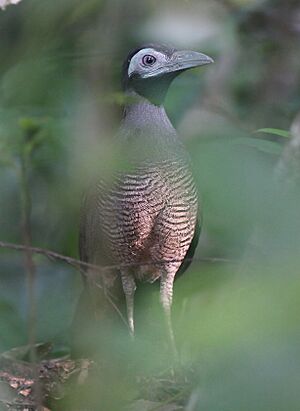Bornean ground cuckoo facts for kids
Quick facts for kids Bornean ground cuckoo |
|
|---|---|
 |
|
| Conservation status | |
| Scientific classification |
|
| Kingdom: | Animalia |
| Phylum: | Chordata |
| Class: | Aves |
| Order: | Cuculiformes |
| Family: | Cuculidae |
| Genus: | Carpococcyx |
| Species: |
C. radiceus
|
| Binomial name | |
| Carpococcyx radiceus (Temminck, 1832)
|
|
| Script error: The function "autoWithCaption" does not exist. | |
| Synonyms | |
|
Carpococcyx radiatus (Temminck, 1832) |
|
Script error: No such module "Check for conflicting parameters".
The Bornean ground cuckoo (Carpococcyx radiceus) is a big bird from the cuckoo family. It lives mostly on the ground. This special cuckoo is found only on the island of Borneo. You can find it in parts of Brunei, Malaysia, and Indonesia. It likes to live in wet, thick forests. Sadly, its home is shrinking because of habitat loss. This means it's becoming harder for them to find places to live.
Contents
About the Bornean Ground Cuckoo
The Bornean ground cuckoo is a large bird. It spends most of its time on the forest floor. It is part of the cuckoo family, known for many different kinds of birds.
Where it Lives
This cuckoo is special because it lives only on the island of Borneo. It can be found in the countries of Brunei, Malaysia, and Indonesia that share the island. It prefers to live in humid, or very wet, forests.
Why it's Important
The Bornean ground cuckoo is an important part of its forest home. It helps keep the forest healthy. Sadly, its numbers are going down. This is mainly because of habitat loss. People are cutting down forests where these birds live.
Naming the Bornean Ground Cuckoo
The Bornean ground cuckoo got its scientific name a long time ago. Scientists give every animal a special two-part name. This helps everyone know exactly which animal they are talking about.
Who Named It
A Dutch scientist named Coenraad Jacob Temminck first described this bird in 1832. He gave it the name Calobates radiceus. Later, in 1840, another scientist named George Robert Gray decided it needed a new genus name. He called it Carpococcyx.
What the Name Means
The second part of its scientific name, radiceus, comes from Latin words. It might mean "rod" or "staff," or "foundation." Some people think it was a mistake and should have been radiatus, which means "rayed" or "shining." But the original name given by Temminck is still used today.
 | Jewel Prestage |
 | Ella Baker |
 | Fannie Lou Hamer |


